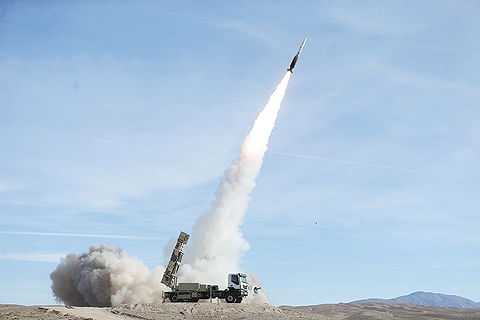 A handout picture shows a Sayad missile fired from the Talash missile system during an air defense drill in an undisclosed location in Iran yesterday. — AFP
A handout picture shows a Sayad missile fired from the Talash missile system during an air defense drill in an undisclosed location in Iran yesterday. — AFPWASHINGTON: The United States vowed yesterday to be “relentless” in countering Iran as sweeping sanctions took effect, but the Islamic republic defiantly promised to stand up to the “bullying” by Washington. US President Donald Trump’s administration nonetheless issued eight exemptions from its demand on all countries to stop buying Iranian oil, the country’s largest export, amid bitter international opposition to the unilateral US sanctions.
Six months after Trump pulled out of an international agreement on ending Tehran’s nuclear program, Secretary of State Mike Pompeo said the ultimate US goal was for Iran to make a “180-degree turn” and abandon its “revolutionary course”. While stopping short of urging regime change, he reiterated demands for Iran to end policies rooted in the 1979 Islamic revolution including its support for regional proxies such as the Lebanese militia Hezbollah and its development of missiles.
“We hope a new agreement with Iran is possible, but until Iran makes changes in the 12 ways I listed in May, we will be relentless in exerting pressure on the regime,” Pompeo said. He said the sanctions - which took effect on the 39th anniversary of Iranian zealots’ seizure of the US embassy following the ouster of the pro-US shah - intended to “starve the Iranian regime of the funds it uses to fund violent activity throughout the Middle East and around the world”.
UN inspectors say Iran is abiding by an agreement reached with Trump’s predecessor Barack Obama to draw down its nuclear program. That deal was backed by European powers, Russia and China and sealed by a UN Security Council resolution. “I announce that we will proudly bypass your illegal, unjust sanctions because it’s against international regulations,” Iran’s President Hassan Rouhani said in a televised speech as the sanctions took effect. “We are in a situation of economic war, confronting a bullying power. I don’t think that in the history of America, someone has entered the White House who is so against law and international conventions,” he added.
In one of Tehran’s bazaars, there was anxiety over the future. “The shadow of the sanctions has already affected the economy in a disastrous way, people’s purchasing power has plunged,” said Ehsan Attar in his herbal remedy shop. Rouhani said four countries had approached him during his visit to New York for the UN General Assembly in September, offering to mediate with the US but he turned them down. “There is no need for mediation. There is no need for all these messages. Act on your commitments, and we will sit and talk,” he said.
But Foreign Minister Mohammad Javad Zarif, in an interview published yesterday with USA Today, said Iran would consider fresh diplomacy if there were a “different approach” by Washington. The latest tranche of US sanctions aims to significantly cut Iran’s oil exports - which have already fallen by up to one million barrels a day since May - and cut off its banks from international finance. The Belgian-based SWIFT banking network, the backbone for international monetary transfers, said yesterday it had suspended several Iranian banks from its service.
The International Monetary Fund forecasts that US sanctions will cause Iran’s economy to contract 1.5 percent this year and 3.6 percent next year - pain that Trump has boasted about as he touts his record ahead of today’s congressional elections. Iran’s economy was already suffering major structural problems - including widespread corruption, weak investment and a banking sector laden with toxic assets - before Trump walked out of the deal. Rouhani’s plan since his election in 2013 was to boost the economy by rebuilding ties with the world and attracting billions of dollars in foreign investment - a strategy that now looks in tatters.
The United States issued eight waivers to its ban on buying Iranian oil - to China, India, Italy, Greece, Japan, South Korea, Taiwan and Turkey. Pompeo said that the eight had demonstrated that they were reducing purchases of Iranian oil and that the United States recognized special circumstances, as well as the need not to disrupt energy markets. One notable exemption was Iraq. Had it been granted a waiver, analysts say it would have been easier for Iran to mix its crude with production from its neighbor to sell on international markets.
The other parties to the nuclear deal - Britain, France, Germany, China and Russia - have vehemently opposed the US move and vowed to keep alive the accord, technically known as the Joint Comprehensive Plan of Action (JCPOA). “We will do everything necessary in the interests of preserving and expanding international trade, economic and financial cooperation with Iran despite US sanctions,” said Russia’s foreign ministry.
The only support for the US position has come from Iran’s regional rivals, notably Saudi Arabia and Israel, whose prime minister, Benjamin Netanyahu, hailed the start of sanctions as “a historic day” Foreign companies and banks are largely unwilling to make enemies of the US Treasury, and most international firms that set up in Iran after the 2015 deal have been forced to leave, including France’s Total, Peugeot and Renault, and Germany’s Siemens.
“Unfortunately, we were treated dishonorably by both the American and Iranian governments,” said Fereshteh Safarnezhad, a 43-year-old teacher, on the streets of Tehran. “The Americans never really committed to the deal and the Iranian government did not spend the cash it got from the deal on the people.” The Iranian military launched two days of air defense drills yesterday across northern Iran, and state TV aired footage of surface-to-air missiles and air defense systems. Iran’s elite Revolutionary Guards Corps are among the forces participating. - Agencies




